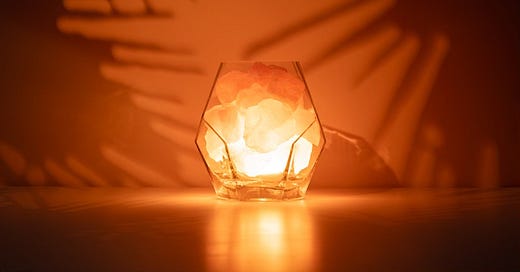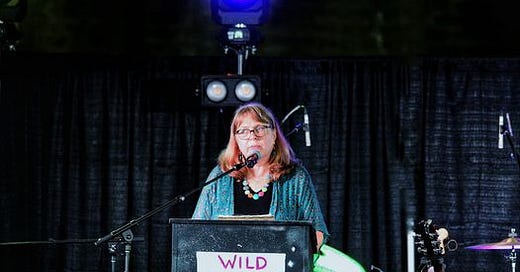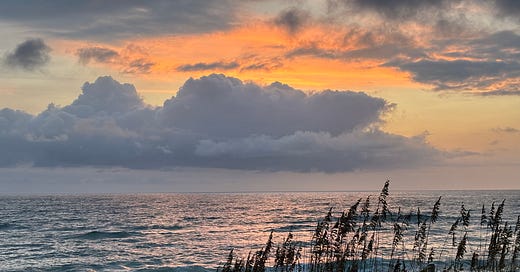

Discover more from The Cottage
Today is the Nineteenth Sunday after Pentecost.
My thoughts are turning toward autumnal gratitude. And salt. Yes, salt.
The Cottage is a reader-supported newsletter and community.
That means there are no institutional or corporate sponsors, no advertisements, no grants, no denominational backing, and absolutely no email list-selling behind this project.
The Cottage is made possible by paid subscriptions alone.
I deeply appreciate the prayers and financial support of this community — the tangible, practical ways you stand with this work. If you are able, please consider becoming a paid subscriber. Thank you.
Mark 9:38-50
John said to Jesus, “Teacher, we saw someone casting out demons in your name, and we tried to stop him, because he was not following us.” But Jesus said, “Do not stop him; for no one who does a deed of power in my name will be able soon afterward to speak evil of me. Whoever is not against us is for us. For truly I tell you, whoever gives you a cup of water to drink because you bear the name of Christ will by no means lose the reward.
“If any of you put a stumbling block before one of these little ones who believe in me, it would be better for you if a great millstone were hung around your neck and you were thrown into the sea. If your hand causes you to stumble, cut it off; it is better for you to enter life maimed than to have two hands and to go to hell, to the unquenchable fire. And if your foot causes you to stumble, cut it off; it is better for you to enter life lame than to have two feet and to be thrown into hell. And if your eye causes you to stumble, tear it out; it is better for you to enter the kingdom of God with one eye than to have two eyes and to be thrown into hell, where their worm never dies, and the fire is never quenched.
“For everyone will be salted with fire. Salt is good; but if salt has lost its saltiness, how can you season it? Have salt in yourselves, and be at peace with one another.”
It has been a full week of speaking and traveling. But I’m home this weekend. On Saturday morning, I went to a local farm stand where I bought some beautiful Concord grapes. They are deep purple, bursting tart and sweet on the tongue at the same time. It is the autumn harvest, and the earth is yielding its most delectable fruits. I love local grapes; they taste like fall.
Autumn is a time of gratitude.
While still eating those grapes with gratitude, I opened the lectionary and read today’s passage from Mark:
Whoever is not against us is for us. And now how everyone is going to be salted with fire. If salt has lost its saltiness, how can you season it? Have salt in yourselves and be at peace with one another.
Hmmmmm. The sweetness of gratitude and spiritual saltiness? Sounds like a dish that would get a contestant kicked off of Top Chef.
I confess: I'm a cooking show fanatic. I love Top Chef, Chopped, and pretty much everything on the Food Network. I even love Halloween Baking Championship.
One of the things that frequently happens on these shows is that the judges will criticize chefs for not putting enough salt on their food.
Judge Geoffrey Zakarian will say, “This needs salt, man.” Or Top Chef host Tom Colicchio, “There's not enough salt. You need to learn to season your food. That’s basic.”
Well, when I first started watching cooking shows, I thought that Geoffrey Zakarian and Tom Colicchio were telling chefs that they needed to take a salt shaker, like the kind that sits on our tables, and sprinkle more salt on the food.
Over the years, as I've gotten to be a better cook, I've learned about that salt shaker — and the pepper shaker — in the kitchen. Those shakers look the same, but they are not the same. Salt and pepper work very differently. And understanding the difference between the two actually enlivens Jesus’ words.
Pepper is a spice.
If you have pepper, just plain old pepper, in a shaker, or more optimally, a grinder, the flavor is released when the pepper is cracked or ground. When you put pepper on a chicken breast, you're not getting the taste of the chicken breast. Instead, you're getting the oil from the cracked pepper on top of the chicken breast. Pepper adds pepper flavor to enhance or complement the chicken. That's how spices work. They add their flavor to ingredients.
But salt is not pepper. It is not a spice.
Salt is a mineral. It's found all over the world, at the edge of the sea, in caves where there was once water.
When this mineral — salt — is added to food, something extraordinary happens. Almost like a miracle.
When salted, food undergoes a number of chemical reactions that change the texture and flavor of the food from within. Pepper adds spice on the outside but salt changes the food from the inside out.
Great cooks throughout the world know that salt has a greater impact on what they're cooking than any other ingredient.
They also know that food is not supposed to be salty, but rather it is supposed to be salted. And eventually, great chefs learn exactly how much salt to add at what stages of cooking to unlock the flavor of food. Great cooking isn’t about making salty chicken, but a proper salting brings out the real flavor of the chicken.
Not only does this magic mineral work from the inside out, it also reduces bitterness. We humans find bitter things difficult to swallow, quite literally. Bitterness often ruins the taste of food. But salt modifies any bitterness within food and balances it out.
Salt will always distribute itself evenly to season whatever you are cooking from within, bringing out the best flavor of food while balancing out whatever might be less palatable. That's pretty amazing. But salt does it.
The quick difference between the pepper and salt? Pepper is put on the outside and salt brings out what is the inside. One adds its own flavor; the other brings flavor forth.
When I think about this verse in relation to gratitude, everything shifts. You might say something new comes forth!
We often think of spiritual practices like gratitude — or meditation or prayer — as if they are pepper. Maybe you already have a pretty good life, generally happy, successful, or healthy. We are blessed. Spiritual practices give some additional flavor.
Peppering gratitude is little like sprinkling thanks on top of our blessings. We add a bit of extra spice to give those good things a bit more flavor, an extra kick.
In effect, that’s like peppering privilege.
In recent years, science has discovered that gratitude is not like seasoning life on the outside. Instead, genuine gratitude, deep gratitude, is more like salt. It changes us from within.
A while ago, I saw this headline in the Washington Post:
Can gratitude help you recover from a heart attack?
The article said absolutely yes.
Indeed, gratitude will actually change your heart.
The piece reported that if people who had heart episodes practiced gratitude through or in advance of that heart event, those patients had better outcomes than people who weren't practicing gratitude. Medical researchers, psychologists, and social scientists have studied gratitude in relation to heart attacks and a number of other conditions and diseases — and they’ve found that gratitude is not only good for your heart but pretty much every other part of you, too.
People who practice gratitude become grateful people — they build up something inside, a reserve of resilience enabling them to meet health challenges more easily than people who are not grateful.
Gratitude is really good for us.
Professor Robert Emmons, an expert who studied gratitude for decades, points out how scientific studies have shown that gratitude blocks toxic emotions, envy, resentment, regret, and depression. If you have a strong sense of being grateful, it changes the way your brain functions.
Practicing gratitude strengthens empathy, courage, and compassion. It strengthens resilience and gives us a greater capacity to connect with others in community.
Gratitude is like the salt of spiritual practice. Gratitude changes you from within. Thankfulness is not a flavor we add to life.
We humans possess an almost innate inclination to say thank you, to recognize the giftedness of life, to be able to live in this universe in such a way that we appreciate not only the good that has been directed toward us but the good we help make and the good that our neighbors make.
But that innate sense gets clogged up by other things. By cultural biases, negative experiences, and our own doubts and fears. All kinds of stuff spoils innate thankfulness. And so, we need to practice gratitude — pay more attention to it, be more intentional about gratefulness, purposefully add it to our lives. It is like salting food.
Gratitude brings what is deep inside to the surface; it intensifies the best flavors of our lives. And gratitude modifies any bitterness or spoilage that may have developed within. Everything gets tastier.
Jesus said, “Have salt in yourselves and be at peace with one another.” That is deeply and profoundly true. If we live a life that is salted with gratitude, it opens us toward the world and toward one another in peace.
Brother David Steindl-Rast, a 98-year-old Benedictine monk, gave a TED talk on gratitude that has been viewed almost 10,000,000 times, making it one of the most watched talks ever recorded. His wise words amplify those of Jesus — Have salt in yourself and be at peace with one another.
Brother David insisted,
If you're grateful, you're not fearful. And if you're not fearful, you're not violent.
If you are grateful, you act out of a sense of enough and not a sense of scarcity, and you are willing to share.
If you are grateful, you are enjoying the differences between people and are respectful to everybody.And that changes the power pyramid under which we live.
I think that's exactly what Jesus was saying. The power pyramid under which we live is the thing that makes us anxious and ungrateful. It is what embitters our souls. Fear, scarcity, and bigotry sap the flavor from life — as we try to survive in what is really a truly an unfair, unjust, and cruel world.
But gratitude draws out what resides within us. Deep inside, we are profoundly aware that God has gifted the whole of the universe, that this life is a gift, and our lives are surrounded by gifts. That changes everything.
Have salt in yourselves. Be at peace with everyone.
Salted with gratitude.
Comments are always open to paid subscribers. The commenting period for free subscribers and visitors is limited to a day following publication.
INSPIRATION
Be still, my soul, and steadfast.
Earth and heaven both are still watching
though time is draining from the clock
and your walk, that was confident and quick,
has become slow.
So, be slow if you must, but let
the heart still play its true part.
Love still as once you loved, deeply
and without patience. Let God and the world
know you are grateful. That the gift has been given.
— Mary Oliver, “The Gift”
There is in each of us an ocean
full of secrets strange and luminous,
an ocean with depths we do not understand,
with dark we often fear,
a place almost impossible to visit
and yet it moves with us
everywhere we go,
informs every conversation,
underlies every thought.
There is treasure there,
but it belongs to the depths
the way the heart
belongs to the body.
Everything depends on this.
Lately, I’m learning to think of treasure
only as a verb,
not as a thing to be taken.
I’m learning that to live
is to be an ocean.
— Rosemerry Wahtola Trommer, “Blood, Like Salt Water”
UPCOMING AT THE COTTAGE
A SPECIAL SCREENING OF A NEW DOCUMENTARY, TRUE BELIEVER.
Paid subscribers at The Cottage are invited to a private online screening of True Believer. You’ll be able to watch the film during a three-day period from October 8-12.
Details on accessing the film TBA in the next few days.
On Wednesday, October 9, Kristen Irving, the filmmaker, will be at The Cottage for a live discussion of the documentary (it will be recorded for those unable to attend the live conversation) in conjunction with the special screening.
About the film:
Born in 1981 just as the Religious Right's culture war crashed into visibility, a then evangelical filmmaker discovers the true origins of the "pro-life" movement. While disbelief initiates her investigation into a veiled history of white supremacy, betrayal forces a deeply personal examination of her own family and identity, neither of which can be disentangled from the other. As Roe is overturned and abortion bans become routine, TRUE BELIEVER is a call for reckoning for every American, but especially those within the religious subculture that threatens our very Democracy.
SOUTHERN LIGHTS IS BACK!
Join me, Brian McLaren, and our special guests Robert P. Jones, Dante Stewart, Jacqui Lewis, and Mihee Kim-Kort, on beautiful St. Simons Island, Georgia on January 17-19, 2025.
This January, we will gather to “Reimagine Faith and the Future of Democracy.”
Regardless of who wins in November, Southern Lights is going to be a three-day gathering to help us assess, get centered, and re-ground ourselves for the future. Southern Lights is for safe and inspiring conversations about things people are afraid to discuss in church.
Come to the live event or attend virtually. Information and registration HERE.
SPECIAL DISCOUNTS:
Cottage Discount: Good until September 30, 2024. Get 15% off! Use this code – Cot25Sub – when registering. (This is the same discount as the early bird rate.)
Under 40: A 15% discount. Use this code — Under4025 — when registering.
Group Discount: If you have ten or more registered from your church or organization, you can receive a 15% discount for the entire group! Email info@southernlightsconference.com for more details.
The cure for anything is salt: sweat, tears or the sea.
— Karen Blixen
A beautiful, short video to refresh your soul — and salt you with gratitude!
















I am delighted to find that your Sunday Musing is on gratitude. I too, am thinking about gratitude these days--on how to be grateful when your world rips apart: your loved one has died, you or your loved one has a stroke, has stage 4 cancer, a child with addiction, a family that hates you because of your politics.
Too many see gratitude the way my 7th grade teacher, Mrs. Coleman harped on us just before lunch. "Eat your lunch," she'd admonish. "Think of all the starving kids in China." But that's not gratitude--or its why or how. I practice gratitude because that's how God gets in. When my heart is boarded over with fear or resentment, if I find some tiny thing to be thankful for, I learn again that God has never left me after all. Thank you for your wise words. Linda at The Deep End
Thank you for sharing The Grateful Day video. I had not seen it before and it is beautiful.